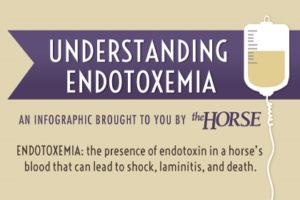How Firocoxib Could Help Colic Surgery Patients

Amanda Ziegler, DVM, PhD, a postdoctoral research fellow at the North Carolina State University College of Veterinary Medicine, in Raleigh, and colleagues conducted the research, and she presented their findings at the 2018 American Association of Equine Practitioners Convention, held Dec. 1-5 in San Francisco, California.
Non-steroidal anti-inflammatory drugs (NSAIDs) target the enzyme cyclooxygenase (COX), which is responsible for the body’s inflammatory responses. There are two COX “subtypes”: COX-2 is primarily associated with the development of inflammation and, so, can contribute to signs of endotoxemia, while COX-1 is associated with normal day-to-day inflammation-prevention or -attenuation processes such as protecting the gastric mucosa (lining) and promoting gut barrier function. This barrier is important, because it’s what can keep endotoxin—which is released after a proliferation and die-off of Gram-negative gut bacteria sparked by colic—from leaking into the bloodstream at levels that can overwhelm the immune system and be deadly.

While traditional NSAIDs, such as flunixin meglumine (Banamine, typically used to provide pain relief in colic cases), block both COX-1 and -2, (and, so, are referred to as nonselective), some newer ones—like firocoxib—are selective, designed to target COX-2-associated inflammation while sparing COX-1 enzymes that could help reduce the likelihood of endotoxemia development
Create a free account with TheHorse.com to view this content.
TheHorse.com is home to thousands of free articles about horse health care. In order to access some of our exclusive free content, you must be signed into TheHorse.com.
Start your free account today!
Already have an account?
and continue reading.

Written by:
Erica Larson
Related Articles
Stay on top of the most recent Horse Health news with



















